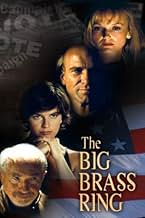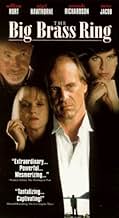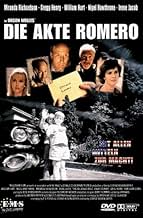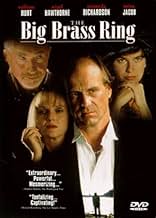Blake Pellarin is on the campaign trail to become Governor of the state of Missouri. During his stop in St. Louis, a chance encounter brings his past roaring back to haunt him. Will the trut... Read allBlake Pellarin is on the campaign trail to become Governor of the state of Missouri. During his stop in St. Louis, a chance encounter brings his past roaring back to haunt him. Will the truth ruin his chances to be elected, or will he land the "Big Brass Ring"?Blake Pellarin is on the campaign trail to become Governor of the state of Missouri. During his stop in St. Louis, a chance encounter brings his past roaring back to haunt him. Will the truth ruin his chances to be elected, or will he land the "Big Brass Ring"?
- Awards
- 1 win & 3 nominations total
Irène Jacob
- Cela
- (as Irene Jacob)
Peggy Freisen
- Gigi Moorehead
- (as Peggy Friesen)
Featured reviews
5=G=
"The Big Brass Ring" tells of a Missouri gubernatorial candidate (Hurt) who find himself haunted by guilt, stalked by a beautiful reporter, and the possible target of an assassination plot. A blotch on "Singblade" director Hickenlooper's resume coming on the heels of a worthy little indie "Dogtown", this tale of redemption and regret loses it humanness in a circus of pompous dialogue, overwrought histrionics, vague noir ambiance, and disjointed editing. In spite of fine performances and filming, "The Big Brass Ring" can't manage one believable character much less one reason to care leaving only a sense of detached ambivalence and confusion. A very attractive but passable DVD watch for fans of the players only. (C)
The Big Brass Ring apparently never made it to a movie theater, and doesn't get anywhere else, either. The script, credited posthumously to Orson Welles, takes a number of twists and turns, but they are neither clever or clear. William Hurt portrays Missouri gubernatorial candidate Blake Pellarin, an independent running against another independent, which is unlikely enough. The fact that both candidates sport Southern accents even though it is set in Missouri is another peculiarity that is never explained. Miss it and you'll be better off.
William Hurt plays Gubernatorial candidate William Blake, in the final days of his election campaign. Nigel Hawthorne is Kim Mennaker, a svengali figure from Blake's childhood, who lives in Cuba for some reason, and has evidence which can sink Blake's election chances. Actually, by halfway through the movie, half of Missouri seems to have this evidence, and why nobody actually uses it is about as bewildering as why Hurt wanders about all night with a monkey on his shoulder, which he had previously complained had urinated all over him - unless that's a pun on a monkey for his back.
As usual, William Hurt is boring (look, I'm sorry, but he just is). Nigel Hawthorne, on the other hand, is incapable of being less than good, though his character is really quite ridiculous.
An understated movie, which, I admit, has emotional subtleties and plot complexities which keep it above average, but which ultimately don't save it from being a bit soporific. I'll give it 6.0. Worth watching, but don't expect to be dazzled.
As usual, William Hurt is boring (look, I'm sorry, but he just is). Nigel Hawthorne, on the other hand, is incapable of being less than good, though his character is really quite ridiculous.
An understated movie, which, I admit, has emotional subtleties and plot complexities which keep it above average, but which ultimately don't save it from being a bit soporific. I'll give it 6.0. Worth watching, but don't expect to be dazzled.
This may be a flawed masterpiece or perhaps a mediocre movie with a lot to recommend it. I enjoyed it and would like to see it again, partly to make sure the plot worked and partly to catch some nuances that I missed. And also because, as my esteemed colleague, flickjunkie, notes below, the audio is atrocious and my ears are not as sharp as they once were. But life is short and the entire opus of film is long...but maybe I can edit with the fast forward!
Okay, let's look at the evidence. Script by Orson Welles: somewhat amazing since he died in 1985. His last work. That alone may make this worth watching. William Hurt plays a southern pol, Blake Pellarin, running for governor of Missouri. Miranda Richardson plays his rich, alcoholic wife, and she is very good. Nigel Hawthorne is Kim Mennaker, Blake's one time mentor, a shadowy, behind the scenes political figure, a cynical character who is writing a 27,000-page memoir, which no doubt includes much about his love for the Pellarin boys. Irène Jacob plays Cela Brandini, a TV reporter fascinated with Blake. The one-time protégé of French-Polish director Krzysztof Kieslowski is not shown to advantage here. I'm not sure why, but there is little subtlety in the way she plays the part. To really appreciate what she can do, see her in La Double vie de Véronique (1991) or Trois Couleurs: Rouge (1994), both directed by Kieslowski. She is very beautiful and very winning.
William Hurt, contrary to some opinion, was excellent. His characteristic laid-back, almost languid style works strangely well for a southern pol. He is certainly different, but believable, although I don't think his style would have worked had his character been running for president, as in Welles's original script. (Incidentally, they really wanted Louisiana, not Missouri, for the locale.) Hurt's performance reminds me in some ways of his work in the outstanding but now somewhat neglected, Kiss of the Spider Woman (1985), for which he won an academy award.
The Big Brass Ring never had a theatrical release, and it is not hard to see why. The print is too dark and the story too murky and hard to follow. It appears that the brothers changed identities when young and never bothered to change back. Apparently Blake's brother and not Blake was the subject of the homosexual photo, but I'm not sure. To make this movie work for a mass audience, the true status of the boys then, and during the time of the action, must be made clear.
(Note: Over 500 of my movie reviews are now available in my book "Cut to the Chaise Lounge or I Can't Believe I Swallowed the Remote!" Get it at Amazon!)
Okay, let's look at the evidence. Script by Orson Welles: somewhat amazing since he died in 1985. His last work. That alone may make this worth watching. William Hurt plays a southern pol, Blake Pellarin, running for governor of Missouri. Miranda Richardson plays his rich, alcoholic wife, and she is very good. Nigel Hawthorne is Kim Mennaker, Blake's one time mentor, a shadowy, behind the scenes political figure, a cynical character who is writing a 27,000-page memoir, which no doubt includes much about his love for the Pellarin boys. Irène Jacob plays Cela Brandini, a TV reporter fascinated with Blake. The one-time protégé of French-Polish director Krzysztof Kieslowski is not shown to advantage here. I'm not sure why, but there is little subtlety in the way she plays the part. To really appreciate what she can do, see her in La Double vie de Véronique (1991) or Trois Couleurs: Rouge (1994), both directed by Kieslowski. She is very beautiful and very winning.
William Hurt, contrary to some opinion, was excellent. His characteristic laid-back, almost languid style works strangely well for a southern pol. He is certainly different, but believable, although I don't think his style would have worked had his character been running for president, as in Welles's original script. (Incidentally, they really wanted Louisiana, not Missouri, for the locale.) Hurt's performance reminds me in some ways of his work in the outstanding but now somewhat neglected, Kiss of the Spider Woman (1985), for which he won an academy award.
The Big Brass Ring never had a theatrical release, and it is not hard to see why. The print is too dark and the story too murky and hard to follow. It appears that the brothers changed identities when young and never bothered to change back. Apparently Blake's brother and not Blake was the subject of the homosexual photo, but I'm not sure. To make this movie work for a mass audience, the true status of the boys then, and during the time of the action, must be made clear.
(Note: Over 500 of my movie reviews are now available in my book "Cut to the Chaise Lounge or I Can't Believe I Swallowed the Remote!" Get it at Amazon!)
This is a movie that someday will be remade so that it can be understood by those who haven't read the script. The premise of the movie is that a guy switches identity with his brother (I think) and proceeds to live their lives as one another.It is not convincing as to the reason why both would want to do so or how this would be pulled off for those who knew them. Overall most viewers should find this something to avoid.
Did you know
- TriviaThe "big brass ring" of the title is a reference to the high brass rings found in old fashioned gyms and swimming pools, which one was supposed to jump up to and grab. It is a metaphor for that which is difficult to attain, or at least hard to hold fast and retain.
- GoofsIn the scene just after Blake (Hurt) and Brandini (Jacob) make love, she is still in bed and trying to encourage Blake to go public with the truth. She suggests that she might expose him if he doesn't. Blake yanks off the bedcovers, exposing her completely-naked body. But in the next-second close-up, something covers her from the waist down.
- ConnectionsReferences Citizen Kane (1941)
- SoundtracksMortal Thoughts
Written and Performed by Scott Nickoley (ASCAP) and Jamie Dunlap (as Jaime Dunlap) (BMI)
Published by Red Engine Music (ASCAP), Revision West (BMI), Brunello Music (ASCAP), JDSoul Music (BMI)
Courtesy of Mark Ferrari/Mastersource
Details
Box office
- Budget
- $7,000,000 (estimated)
- Runtime
- 1h 44m(104 min)
- Color
- Sound mix
- Aspect ratio
- 1.33 : 1
Contribute to this page
Suggest an edit or add missing content



































